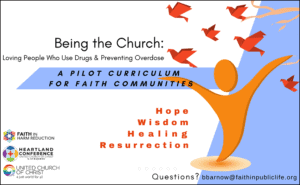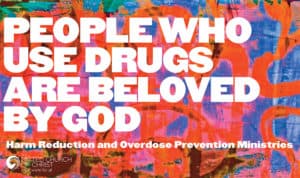Harm Reduction Curriculum Pilot Program Offers New Path for Overcoming Drug Overdose Epidemic

A new curriculum pilot program currently underway in the UCC’s Heartland Conference holds the promise of increased harm reduction and overdose prevention. It’s the first undertaking of the conference’s Heartland Harm Reduction and Overdose Prevention Network, of which the Rev. Dr. Elyse Berry, CHHSM’s associate for advocacy and leadership development, is a part.
In one of the network’s first meetings, “we discussed how there are so many people touched by drug overdose, but not a lot of awareness about what harm reduction is, how the UCC is involved in that movement, and what faith communities can do — and understand more deeply — about this crisis,” said Berry. The pilot program curriculum grew out of that meeting.
The seven-week curriculum has Eastertide as its theme. Each week includes an opening prayer, scripture reading, content, journaling exercises, and a closing prayer. Sessions are approximately an hour to an hour-and-a-half in length. Contributors include Berry, the Rev. Janet Ross, pastor of Amistad Chapel UCC, Hank Osmundson of Unitarian Universalist Justice Ohio, and Blyth Barnow and Daniel Clark from Faith in Public Life Ohio.
Harm reduction, which involves minimizing the negative health, social, and legal impacts associated with drug use, drug policies and drug law, is grounded in justice and human rights. It focuses on positive change and on working with people without judgement, coercion, discrimination, or requiring that they stop using drugs as a precondition of support.
According to the CDC, overdose deaths in the United States exceeded 100,000 last year. “The Heartland Conference inhabits three of the top five states where those deaths occurred,” says the Rev. David Long-Higgins, conference minister. “There is a sense of urgency and paralysis that often intersect when this reality is named out loud. The question arose in our life together, ‘What might be a helpful way for people to better understand both these realities and the most helpful responses that could arise from congregations?’ Out of this question, there was a realization that in order for there to be understanding and empowerment there needed to be a hands-on resource that could open up constructive and helpful congregational conversations and engagements. This curriculum seeks to be one such resource.”

Following the pilot program, the network will seek feedback from the participants, and then make edits in the program. The goal is to then partner with the UCC’s Harm Reduction and Overdose Prevention Ministries to roll out the curriculum nationally. The program is supported by Faith in Harm Reduction, and parts of its toolkit are used in the program.
Berry said that she hopes that participants will come away with a deeper understanding of the overdose crisis, the war on people who use drugs, the leadership of lived experience that guides the harm reduction movement, and what faith communities can do.
“I also hope that people will have an encounter with the spiritual questions ever present alongside the content and concepts,” Berry added. “What does it mean to love? What’s my relationship with control, judgment, and perfectionism? What does all of this mean for who I understand God to be, and for discipleship?”
Long-Higgins said he hopes for greater understanding. “Our hope is that harm reduction can be better understood so that people are kept alive and empowered to claim their own agency for healing,” he said. “Our further hope is that congregations will discern a calling around this important call to love in ways that are truly life-giving.”
Join Our Mailing LIst
"*" indicates required fields
Follow on Facebook
Hoyleton’s ‘Be the Light’ Honors Volunteers, Raises $94,000 for Programming - CHHSM
www.chhsm.org
Hoyleton (Ill.) Youth and Family Services lit up the room Feb. 28 during its 42nd Annual Hoyleton Honors celebration. With the theme of “Be the Light,” Hoyleton highlighted the numerous ways the o...